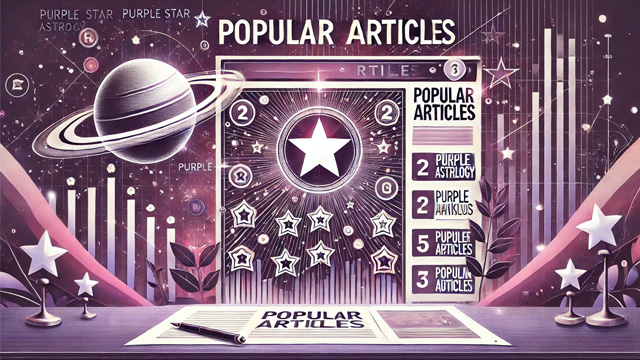The Yin and Yang Behind Personalities in Purple Star Astrology

The concept of Yin and Yang originates from the ancient Chinese classic, the Yi Jing, which explores the patterns of change in all things through a binary model. "The Yi Jing has the Taiji, which produces the Two Forms," referring to the origin of Yin and Yang. The widely known Taiji diagram also derives from this concept.
Understanding the Major Stars
In Purple Star Astrology, there are 108 stars, but only 14 major stars hold the most significance. These stars are:
Zi Wei
Tian Ji
Tai Yang (Sun)
Wu Qu
Tian Tong
Lian Zhen
Tian Fu
Tai Yin (Moon)
Tan Lang
Ju Men
Tian Xiang
Tian Liang
Qi Sha
Po Jun
These fourteen major stars are placed in the twelve palaces of the natal chart. The star that falls in the Palace of Life is the major star of the Palace of Life, representing the primary personality traits of the individual, influencing their behavior and destiny.
Yin and Yang Attributes
Purple Star Astrology originates from the Yi Jing, and from the Yi Jing's perspective, the fourteen major stars can be divided into two categories based on their Yin and Yang attributes:
Yang major stars:
Zi Wei
Tian Fu
Wu Qu
Tian Xiang
Lian Zhen
Qi Sha
Po Jun
Tan Lang
Yin major stars:
Tian Ji
Tai Yang (Sun)
Tian Tong
Tai Yin (Moon)
Ju Men
Tian Liang
Personality Traits of Yin and Yang
Individuals with Yang personalities are generally more proactive, assertive, quick to act, bold, often self-centered, and have a strong desire to lead. Conversely, those with Yin personalities tend to be more passive, deliberate before taking action, quickly satisfied with themselves, lack ambition for power, avoid responsibilities, but great at relationships and enjoy in-depth research.
Influence of Yin and Yang in Life Scenarios
The influence of Yin and Yang attributes is evident in different scenarios of life. In interpersonal relationships that value harmony and coexistence, such as romance, friendships, and family, people with similar Yin or Yang attributes tend to gather together. Conversely, in goal-oriented environments like the workplace, individuals with opposite Yin and Yang attributes complement each other, making it easier to achieve objectives.
The Importance of the Life Palace among others
Among the twelve palaces in Purple Star Astrology, the Palace of Life is the most important. According to the mathematical arrangement of Purple Star Astrology, if the Palace of Life has a Yang major star, the Palace of Spouse, Palace of Wealth, Palace of Travel, Palace of Career, and Palace of Wellbeing will all have the same Yang major star. These six palaces are known as the "Six Strong Palaces," highlighting a person's proactive and outward-seeking attitudes in life.
In contrast, the Palace of Siblings, Palace of Children, Palace of Health, Palace of Subordinates, Palace of Properties, and Palace of Parents are termed the "Six Weak Palaces" and have Yin attributes opposite to the Palace of Life. The "Six Weak Palaces" do not imply lesser importance but represent a passive attitude towards various relationships and life changes.
Balancing Yin and Yang
In Purple Star Astrology, no major star is inherently good or bad; they merely exhibit different personality traits, strengths, weaknesses, perspectives, and decision-making modes. Understanding and leveraging each star's unique qualities is crucial. As the saying goes, "Heroes emerge in turbulent times," meaning that those with Yang major star personalities often rise to prominence. Conversely, "Capable officials are needed in prosperous times," suggesting that those with Yin major star personalities excel in orderly environments, following established norms and exercising caution, fulfilling the needs and opportunities of their times.
By understanding the Yin and Yang behind personalities in Purple Star Astrology, you can gain deeper insights into your inherent traits and better navigate your life's journey.



